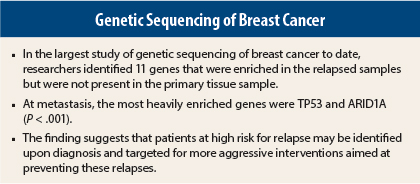Breast tumors that recur appear to have a different genetic profile than those that do not, and they often demonstrate targetable mutations, according to the largest study of genetic sequencing of breast cancer tissue to date.1 This finding was presented at the 2015 European Cancer Congress.
“We identified stark differences between the ‘average’ primary breast cancer and relapsed cancers,” said Lucy Yates, MD, a clinical research oncologist at the Wellcome Trust Sanger Institute in Cambridge, United Kingdom. “This probably reflects a combination of predisposition to relapse and differences in the mutations acquired during the relapse and metastasis phase.” Thus, patients at high risk for relapse might be identified upon diagnosis and targeted for more aggressive interventions aimed at preventing these relapses, she added.
Study Details
This study compared the genetic profiles of breast cancer from 839 tissue samples taken from women upon diagnosis with 161 samples obtained from recurrent or metastatic tumors. According to the investigators, it is the largest and most comprehensive to date in terms of the number of samples from relapsed tumors and the breadth of the genetic sequencing, which examined 365 genes involved in cancer-related pathways.
“For each of the 365 genes, we compared the proportion of cancers in each cohort that contained a driver mutation in that gene,” explained Dr. Yates. Multiple samples were available for 66 patients, which allowed the researchers to trace the evolution of mutations.
The investigators found 11 genes that were significantly enriched in the relapsed cohort compared with the primary tumor cohort. At metastasis, the most heavily enriched genes were TP53 and ARID1A (P < .001). In the estrogen receptor–signaling pathway, ESR1 and FOXA1, but not GATA3, were enriched. In the PI3K-AKT pathway, AKT1 and PIK3RI were enriched—but all to a lesser degree than TP53 and ARID1A.
“We have found that some of the genetic mutations that drive breast cancers that relapse are relatively uncommon amongst cancers that do not relapse at the point of primary diagnosis,” Dr. Yates said.
A wide range of rare or unexpected cancer genes were also implicated at relapse, and immunohistochemical subtype–specific gene patterns were also altered.
“We found even greater inter- and intratumoral heterogeneity than anticipated,” Dr. Yates offered. “The catalogue of likely cancer genes in breast cancer may be even greater than previously anticipated.”
In primary tumors, TP53 dominated in the triple-negative cancers, whereas PIK3CA dominated in estrogen receptor–positive cancers.
“We believe that the differences we have seen reflect genetic differences that can predispose a cancer to return, combined with mutations acquired throughout the period from first diagnosis to the subsequent relapse,” Dr. Yates said. Since many cancers acquire new mutations after the primary diagnosis, it is important to resample the tumor over time, she added.
“The data reveal extreme heterogeneity and indicate that genomic analysis of primary, relapse, and matched normal samples needs to be performed on a large scale. We need to bank more tissue!” she concluded. ■
Disclosure: Dr. Yates reported no potential conflicts of interest.
Reference
1. Yates L, Knappskog S, Martincorena I, et al: The driver landscape of breast cancer metastasis and relapse. 2015 European Cancer Congress. Abstract 1804. Presented September 26, 2015.



